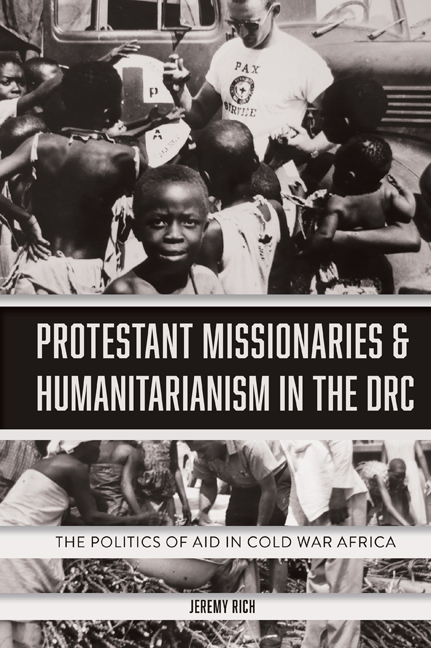Book contents
- Frontmatter
- Contents
- List of Illustrations
- Acknowledgements
- List of Abbreviations
- Introduction
- 1 The CPRA, Protestant Missions, and the Congo Crises, 1960–1965
- 2 The CPRA and Luba Refugees in South Kasai, 1960–1962
- 3 The CPRA and Angolan Refugees in the DRC, 1961–1967
- 4 The CPRA and the Simba Revolts, 1964–1967
- 5 Operation Doctor: The Rise and Fall of a Protestant Short-Term Medical Volunteer Programme
- 6 Protestant Volunteers and Medical Practice in the Congo in the 1960s
- 7 Changing Dollars into Zaires: The Challenges of a Humanitarian Aid NGO in the DRC, 1965–1973
- 8 The Centre for Community Development
- Conclusion
- Bibliography
- Index
2 - The CPRA and Luba Refugees in South Kasai, 1960–1962
Published online by Cambridge University Press: 11 September 2020
- Frontmatter
- Contents
- List of Illustrations
- Acknowledgements
- List of Abbreviations
- Introduction
- 1 The CPRA, Protestant Missions, and the Congo Crises, 1960–1965
- 2 The CPRA and Luba Refugees in South Kasai, 1960–1962
- 3 The CPRA and Angolan Refugees in the DRC, 1961–1967
- 4 The CPRA and the Simba Revolts, 1964–1967
- 5 Operation Doctor: The Rise and Fall of a Protestant Short-Term Medical Volunteer Programme
- 6 Protestant Volunteers and Medical Practice in the Congo in the 1960s
- 7 Changing Dollars into Zaires: The Challenges of a Humanitarian Aid NGO in the DRC, 1965–1973
- 8 The Centre for Community Development
- Conclusion
- Bibliography
- Index
Summary
On 30 June 1961, Congo Protestant Relief Agency aid worker Archie Graber wrote to his missionary colleagues: ‘Today Congo celebrates her first year of independence. For millions this means a year of haunted memories, a year of hunger and starvation, a year of destruction … It was the African who demanded independence at once, when they were not prepared for it, yet as an African proverb puts it, “If your child sets your house on fire, do you throw him in the fire?”’ Graber's paternalism was hardly noteworthy among the North American and European aid workers who entered the Congo after the onset of armed political struggles in July 1960. Graber's story was celebrated by Mennonite missionary journalist Levi Keidel, but Graber and the CPRA have never been incorporated into the larger historiography of the DRC.
Graber worked in the southern region of the Kasai province, a territory wracked by fighting beginning in 1959. Over the course of the 1950s, the northern Kasai became embroiled in a competition between Lulua clans, who claimed to be the original inhabitants of the region, and Luba people, whose families had originated in southern Kasai. Luba ethnic identity had become linked to educational aspirations and migrant labour. Colonial officials favoured Lulua claims to land and political supremacy and urged Luba migrants to move to southern Kasai, much as Moïse Tshombe's CONAKAT political party in the copper-rich southern province of Katanga stigmatised Luba people as interlopers who threatened to usurp communities already established in the region. Lulua militias in northern Kasai and Tshombe's government in Kasai drove Luba people into southern Kasai, to the point hundreds of thousands of refugees had flooded into southern Kasai by August 1960. Albert Kalonji and Joseph Ngalula, two Luba politicians, worked with other Luba leaders to form an autonomous regime, the État Autonome du Sud-Kasaï ASSK), that refused to fully accept the authority of the central Congolese government based in Kinshasa (then Léopoldville). Even as the United Nations and the central Congolese government tried to pressure the ASSK to accept the authority of the Congolese state, ASSK leaders tried to harness the horrific condition of starving Luba refugees to obtain international support.
- Type
- Chapter
- Information
- Protestant Missionaries and Humanitarianism in the DRCThe Politics of Aid in Cold War Africa, pp. 59 - 82Publisher: Boydell & BrewerPrint publication year: 2020



